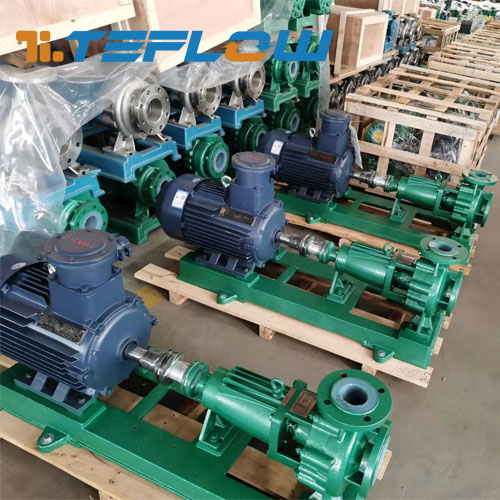The efficiency of a chemical centrifugal pump can be affected by various factors, including:
-
Pump Design: The design of the pump can significantly affect its efficiency. Centrifugal pumps with a higher number of impeller blades or vanes, for instance, tend to be more efficient than those with fewer blades. Additionally, the diameter of the impeller and its shape can also affect the efficiency of the pump.
-
Pump Size: The size of the pump, including the impeller diameter, can affect its efficiency. Generally, larger pumps with larger impellers tend to be more efficient than smaller pumps.
-
Flow Rate: The flow rate of the fluid being pumped can affect the efficiency of the pump. If the flow rate is too high or too low, it can cause the pump to operate outside its optimal range, reducing its efficiency.
-
Operating Speed: The operating speed of the pump can also affect its efficiency. Pumps that are operated at speeds that are too low or too high can have reduced efficiency.
-
Fluid Properties: The properties of the fluid being pumped, such as viscosity and specific gravity, can also affect the efficiency of the pump. Fluids that are more viscous or have a higher specific gravity can require more energy to pump, reducing the efficiency of the pump.
-
Pipe Diameter and Length: The diameter and length of the pipes used in the pumping system can also affect the efficiency of the pump. If the pipes are too small or too long, they can cause friction losses, which can reduce the efficiency of the pump.
-
Suction and Discharge Conditions: The suction and discharge conditions of the pump can also affect its efficiency. If the suction conditions are not optimal, such as if there is air in the pump or if the fluid level is too low, it can cause the pump to operate outside its optimal range, reducing its efficiency. Similarly, if the discharge conditions are not optimal, such as if there are restrictions in the discharge line, it can also reduce the efficiency of the pump.

-
Seal System: The seal system used in the pump can also affect its efficiency. A poorly designed or maintained seal can cause leakage, which can reduce the efficiency of the pump.
-
Motor Efficiency: The efficiency of the motor driving the pump can also affect the overall efficiency of the system. A high-efficiency motor can help improve the efficiency of the pump.
-
Operating Conditions: The operating conditions, including temperature and pressure, can affect the efficiency of the pump. If the temperature or pressure is too high or too low, it can cause the pump to operate outside its optimal range, reducing its efficiency.
-
Maintenance: Regular maintenance of the pump is essential to ensure that it operates at peak efficiency. A poorly maintained pump can have reduced efficiency due to wear and tear on the components or the accumulation of debris or sediment in the pump.





 +86 18130251359
+86 18130251359 teflowpumps@tlpumps.com
teflowpumps@tlpumps.com








 +86+0563-5093318
+86+0563-5093318
